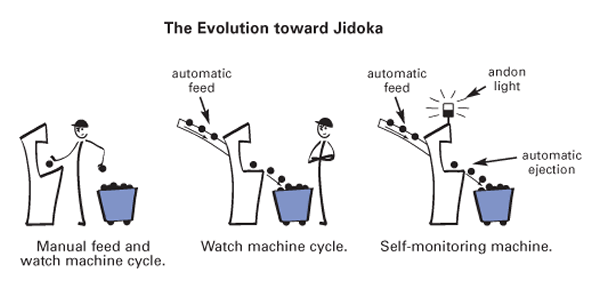Jidoka
Providing machines and operators the ability to detect when an abnormal condition has occurred and immediately stop work. This enables operations to build in quality at each process and to separate men and machines for more efficient work. Jidoka is one of the two pillars of the Toyota Production System along with just-in-time.
Jidoka highlights the causes of problems because work stops immediately when a problem first occurs. This leads to improvements in the processes that build in quality by eliminating the root causes of defects.
Jidoka sometimes is called autonomation, meaning automation with human intelligence. This is because it gives equipment the ability to distinguish good parts from bad autonomously, without being monitored by an operator. This eliminates the need for operators to continuously watch machines and leads in turn to large productivity gains because one operator can handle several machines, often termed multiprocess handling.
The concept of jidoka originated in the early 1900s when Sakichi Toyoda, founder of the Toyota Group, invented a textile loom that stopped automatically when any thread broke. Previously, if a thread broke the loom would churn out mounds of defective fabric, so each machine needed to be watched by an operator. Toyoda’s innovation let one operator control many machines. In Japanese, jidoka is a Toyota-created word pronounced exactly the same (and written in kanji almost the same) as the Japanese word for automation, but with the added connotations of humanistic and creating value.
